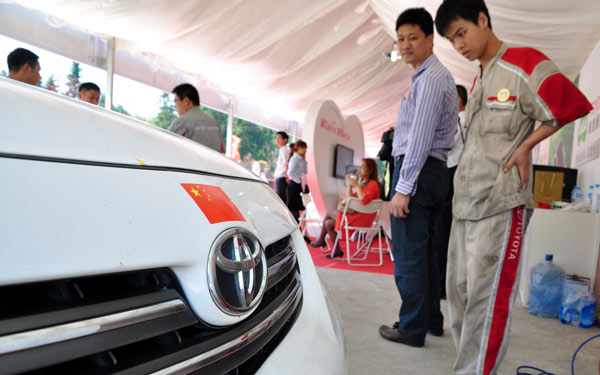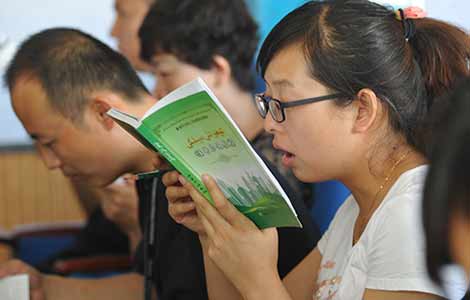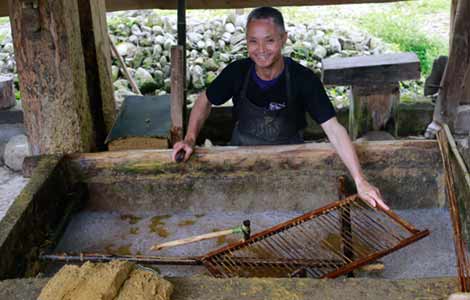China, Japan need to seek solution on dispute
Updated: 2013-08-08 07:13
(China Daily)
|
|||||||||||
EXpert's view | Jin Ying
Results of the 9th Public Opinion on China-Japan Relations 2013 survey, sponsored by China Daily and the Japanese non-profit think tank Genron NPO, were released on Wednesday. The result, which was posted on the main news websites of both countries, immediately attracted attention and triggered discussions.
After reading the reports and comments, I found most of the media concentrated on the point that "90 percent of citizens from each side share a negative impression of the other country."
The 9th Beijing-Tokyo Forum is to be held in Beijing in October. The forum needs to first deal with the embarrassing fact that 90 percent of those questioned have negative impressions. The number reminds me of a Chinese idiom, Jiu Jiu Gui Yi, in which the character Jiu shares the same pronunciation as the number nine in Mandarin. The idiom means that we should trace back to the origin of an issue.
The root reasons behind the current deadlock in Sino-Japanese relations can be summarized as "one issue, two persons and three denials".
|
 |
|
Staff from Toyota Motor Corp overhaul a car in Wuyuan county, Jiangxi province, in October, after Tokyo makes a bid to illegally purchase China’s Diaoyu Islands in September. PROVIDED TO CHINA DAILY |
"One issue" means the territorial dispute over the Diaoyu Islands.
"Two persons" are the two Japanese politicians who intensified the tensions in bilateral relations, namely Prime Minister Shinzo Abe and his predecessor Yoshihiko Noda.
Noda, who once claimed that he wanted to enhance China-Japan communication, was behind Tokyo's illegal purchase of China's Diaoyu Islands on Sept 11. It was like a "terrorist attack" against China.
Beijing refused to acknowledge Japan's action, and firmly declared its sovereignty over the islands.
In later negotiations between the two governments, Noda proposed two new, yet notorious ideas, including "denying the existence of sovereignty disputes" and "denying the consensus of shelving differences and seeking joint development (of the islands)", which further worsened the situation.
When Abe was reelected as prime minister in December, he added another denial - the denial of the possibility of solving the dispute through negotiation. Abe stated, there is "no room for negotiations over the Diaoyu Islands dispute".
Until now, the two Japanese administrations have established "three denials" that they still uphold. With such policies as preconditions, Abe slandered China, saying Beijing "insists on setting premises for the dialogue". That's the crux of the current deadlock in the bilateral relationship.
The forum is to be held on the 35th anniversary of the signing of China-Japan Peace and Friendship Treaty. It is a good opportunity for both sides to work out a solution by learning from the wisdom and strategy of former leaders.
The author is an associate research fellow at the Institute of Japanese Studies at the Chinese Academy of Social Sciences.
Related Stories
Japan, US hold TPP-related bilateral talks 2013-08-07 16:35
Japan reflects on militarism 2013-08-07 07:26
Japan unveils largest military ship 2013-08-06 21:27
Japan launches largest surface combatant 2013-08-06 18:39
Japan's Aso cites Nazis for constitutional amendment 2013-08-01 20:38
Japan diplomat seeks to mend ties 2013-07-31 07:41
Today's Top News
Dairy firms hit with fines
Sino-US trade gap narrows
Exports, spending 'to ebb'
A stage set for big innovation
China helps out energy-starved Pakistan
Paying global tuition made easier
AT&T ready for disaster recovery
China helps out energy-starved Pakistan
Hot Topics
Lunar probe , China growth forecasts, Emission rules get tougher, China seen through 'colored lens', International board,
Editor's Picks

|

|

|

|

|

|





